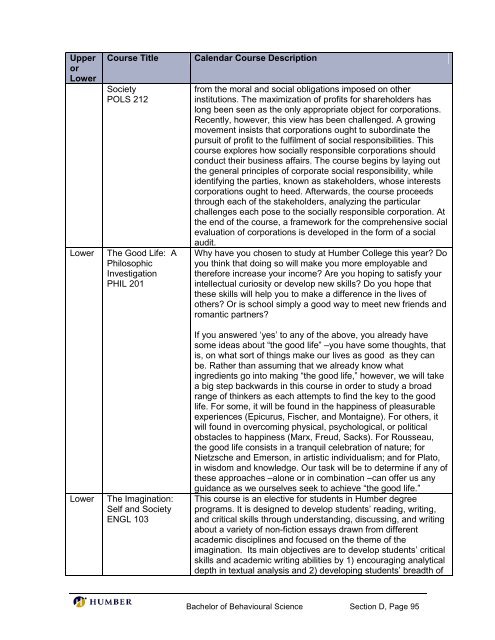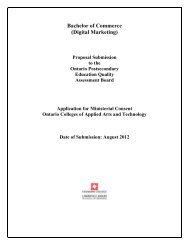Bachelor of Behavioural Science - Postsecondary Education Quality ...
Bachelor of Behavioural Science - Postsecondary Education Quality ...
Bachelor of Behavioural Science - Postsecondary Education Quality ...
You also want an ePaper? Increase the reach of your titles
YUMPU automatically turns print PDFs into web optimized ePapers that Google loves.
Upper<br />
or<br />
Lower<br />
Lower<br />
Lower<br />
Course Title<br />
Society<br />
POLS 212<br />
The Good Life: A<br />
Philosophic<br />
Investigation<br />
PHIL 201<br />
The Imagination:<br />
Self and Society<br />
ENGL 103<br />
Calendar Course Description<br />
from the moral and social obligations imposed on other<br />
institutions. The maximization <strong>of</strong> pr<strong>of</strong>its for shareholders has<br />
long been seen as the only appropriate object for corporations.<br />
Recently, however, this view has been challenged. A growing<br />
movement insists that corporations ought to subordinate the<br />
pursuit <strong>of</strong> pr<strong>of</strong>it to the fulfilment <strong>of</strong> social responsibilities. This<br />
course explores how socially responsible corporations should<br />
conduct their business affairs. The course begins by laying out<br />
the general principles <strong>of</strong> corporate social responsibility, while<br />
identifying the parties, known as stakeholders, whose interests<br />
corporations ought to heed. Afterwards, the course proceeds<br />
through each <strong>of</strong> the stakeholders, analyzing the particular<br />
challenges each pose to the socially responsible corporation. At<br />
the end <strong>of</strong> the course, a framework for the comprehensive social<br />
evaluation <strong>of</strong> corporations is developed in the form <strong>of</strong> a social<br />
audit.<br />
Why have you chosen to study at Humber College this year Do<br />
you think that doing so will make you more employable and<br />
therefore increase your income Are you hoping to satisfy your<br />
intellectual curiosity or develop new skills Do you hope that<br />
these skills will help you to make a difference in the lives <strong>of</strong><br />
others Or is school simply a good way to meet new friends and<br />
romantic partners<br />
If you answered ‗yes‘ to any <strong>of</strong> the above, you already have<br />
some ideas about ―the good life‖ –you have some thoughts, that<br />
is, on what sort <strong>of</strong> things make our lives as good as they can<br />
be. Rather than assuming that we already know what<br />
ingredients go into making ―the good life,‖ however, we will take<br />
a big step backwards in this course in order to study a broad<br />
range <strong>of</strong> thinkers as each attempts to find the key to the good<br />
life. For some, it will be found in the happiness <strong>of</strong> pleasurable<br />
experiences (Epicurus, Fischer, and Montaigne). For others, it<br />
will found in overcoming physical, psychological, or political<br />
obstacles to happiness (Marx, Freud, Sacks). For Rousseau,<br />
the good life consists in a tranquil celebration <strong>of</strong> nature; for<br />
Nietzsche and Emerson, in artistic individualism; and for Plato,<br />
in wisdom and knowledge. Our task will be to determine if any <strong>of</strong><br />
these approaches –alone or in combination –can <strong>of</strong>fer us any<br />
guidance as we ourselves seek to achieve ―the good life.‖<br />
This course is an elective for students in Humber degree<br />
programs. It is designed to develop students‘ reading, writing,<br />
and critical skills through understanding, discussing, and writing<br />
about a variety <strong>of</strong> non-fiction essays drawn from different<br />
academic disciplines and focused on the theme <strong>of</strong> the<br />
imagination. Its main objectives are to develop students‘ critical<br />
skills and academic writing abilities by 1) encouraging analytical<br />
depth in textual analysis and 2) developing students‘ breadth <strong>of</strong><br />
<strong>Bachelor</strong> <strong>of</strong> <strong>Behavioural</strong> <strong>Science</strong> Section D, Page 95
















